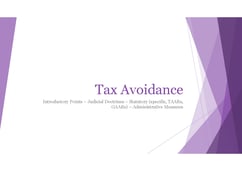IRC v Burmah Oil [1981] TR 535
Judgement for the case IRC v Burmah Oil
Table Of Contents
-
In Ramsay the series of transactions had created an arguably distinct gain and loss which the court determined to treat as one.
In Burmah the scheme sought instead to transmogrify an outstanding debt of £160m owed by a subsidiary within a group of cos to its parent, into an allowable loss.
Unlike in Ramsay specific findings of interdependence between the stages of the Burmah scheme were not possible. The steps taken on 18 December were not factually intertwined with those that had taken place on 12 December, and they were not economically self-cancelling.
The taxpayer was not therefore seeking a step-by-step analysis of a transaction that could instead be characterised as a single taxable event.
Nevertheless, the HL concluded that an extension to these facts of the Ramsay approach was called for.
Lord Diplock
It would be disingenuous to suggest that Ramsay did not mark a significant change in the approach adopted by this House to a pre-ordained series of transactions (whether or not they include the achievement of a legitimate commercial end) into which there are inserted steps that have no commercial purpose apart from the avoidance of a liability to tax which in the absence of those particular steps would have been payable.
The difference is in approach. It does not necessitate the over-ruling of any earlier decisions of this House; but it does involve recognising that Lord Tomlin's oft-quoted dictum in IRC v Duke of Westminster, “Every man is entitled if he can to order his affairs so as that the tax attaching under the appropriate Acts is less than it otherwise would be,” tells us little or nothing as to what methods of ordering one's affairs will be recognised by the courts as effective to lessen the tax that would otherwise attach.
Lord Fraser
It was the duty of Burmah’s directors to take such lawful steps as were open to them to minimize the impact of tax on the company’s profits.
Mcfarlane and Simpson
-
So far as a justification for the extension to Ramsay was concerned, this was found in the presence of a controlling will. The scheme involved, ‘inter-connected transactions between artificial persons, limited cos, without minds of their own but directed by a single mastermind.’
And ‘the reality was that the decision had already been taken to carry it through to completion, and that was unquestionably the intention of the directors in this case, just as it was the intention of all parties concerned in Ramsay.
At this point in its development, the central emphasis of the new approach thus shifted away from factual interconnectedness, towards the presence instead of a controlling will overseeing a pre-ordained scheme. What allowed a number of stages to be treated together was not factual happenstance, but the parties’ intentions towards them.
But, as Lord Oliver recognised in Craven v White, the decision in Burmah Oil required a further element still.
-
As well as the court being ‘entitled to look at the composite transaction as a single transaction having a single legal result’ the ‘further ingredient… establishes… that if you find… a step inserted which has no other purpose than that of avoiding or minimising a liability to tax which, without that step, would be attracted by the transactions, you are entitled for fiscal purposes to ignore that step in assessing what is the true legal result of the series taken as a whole.’
This move was not neccessary in Ramsay, where the claimed loss and gain were simply treated as one transaction, giving rise to neither a gain nor a loss.
-
In Burmah, however, the true legal analysis could not be found by collapsing a series of transactions into one.
Rather, an inserted series of steps was treated for tax purposes as if the steps had not taken place at all.
The passing of money around in a loop through Morh was simply ignored as ineffective for tax purposes, leaving Burmah with its original non-allowable loss.
So apparently this is about intention now - dangerous.
RELATED CASES
For Further Study on IRC v Burmah Oil
Need instant answers? Our AI exam tutor is here to help.
Ask questions 🙋 Get answers 📔 It's simple 👁️👄👁️
Our AI is educated by the highest scoring students across all subjects and schools. Join hundreds of your peers today.
Get StartedSimilar Cases
Related Product Samples
These product samples contain the same concepts we cover in this case.
| Tax Law | Interpretation And Avoidance Notes (19 pages) |
| Tax Law | Tax Avoidance Notes (11 pages) |

 Since 2010, Oxbridge Notes has been a trusted education marketplace, supplying high-quality materials from top achievers at universities like Oxford, Cambridge, LSE, Harvard, and Yale.
Since 2010, Oxbridge Notes has been a trusted education marketplace, supplying high-quality materials from top achievers at universities like Oxford, Cambridge, LSE, Harvard, and Yale.